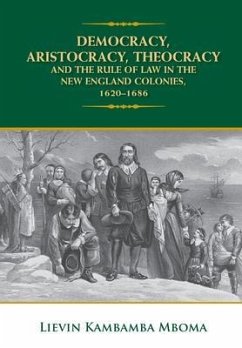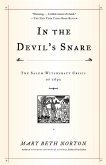DEMOCRACY, THEOCRACY, ARISTOCRACY, AND THE RULE OF LAW IN THE NEW ENGLAND COLONIES, 1620-1686 explores the emergence of various governmental formations in early New England. Namely, pertinent data on the variations of government in the Massachusetts Bay and New Haven colonies are examined for democratic, theocratic, and aristocratic topography. Lievin Kambamba Mboma particularly tackles the instaurations of democratic forms of government in Plymouth, Connecticut, Rhode Island and the settlements of New Hampshire and Maine while under Massachusetts Bay colonial governance. Principal actors like Governors John Winthrop, Thomas Dudley, Richard Bellingham, Harry Vane, Theophilus Eaton, Roger Williams, and John Haynes are discussed given the influence of their personal political thoughts and religious convictions. Mboma similarly notes the contributions of John Cotton, John Davenport, and Thomas Hooker as religious ministers and government actors.
With keen analysis, Mboma simultaneously records the democratic principles advocated by "freemen" in their respective towns, plantations, and villages. When all is considered, clear principles of rule of law in the colonies are revealed as creating the bedrock of Western government, including those of freemen, freedom of conscience and religion, equal justice, personal security, and civil liberties. The Massachusetts Body of Liberties, The English Magna Charta, the Connecticut Fundamental Orders of 1639, The Connecticut Code of 1650, The Mayflower Compact signed in 1620, the Rhode Island Code of 1647 and the Rhode Island Charter of 1663 serve as important primary sources for the laws and orders enacted to secure the liberties of the freemen, servants, and strangers which continue to shape contemporary governance in the United States. Readers will thus understand Mboma's insertion of the Constitution of the United States and his juxtaposing it with law in the New England colonies to connect the continuation of liberties in our current era.
For deeper understanding, towns liberties enjoyed by the freemen along with milestones in the evolution of the representative system of the New England colonies during the period under analysis are presented, and the expansions of self-governing forms of government in New Jersey, New York, and the Puritan settlements in South Carolina and Georgia are analyzed. This work offers scholars, professors, students, and the public vital information on the forms of government instituted in the New England colonies and allows for historical mapping of the legal principles and rule of law that subsequently shaped government in the free nations and United States generally.
With keen analysis, Mboma simultaneously records the democratic principles advocated by "freemen" in their respective towns, plantations, and villages. When all is considered, clear principles of rule of law in the colonies are revealed as creating the bedrock of Western government, including those of freemen, freedom of conscience and religion, equal justice, personal security, and civil liberties. The Massachusetts Body of Liberties, The English Magna Charta, the Connecticut Fundamental Orders of 1639, The Connecticut Code of 1650, The Mayflower Compact signed in 1620, the Rhode Island Code of 1647 and the Rhode Island Charter of 1663 serve as important primary sources for the laws and orders enacted to secure the liberties of the freemen, servants, and strangers which continue to shape contemporary governance in the United States. Readers will thus understand Mboma's insertion of the Constitution of the United States and his juxtaposing it with law in the New England colonies to connect the continuation of liberties in our current era.
For deeper understanding, towns liberties enjoyed by the freemen along with milestones in the evolution of the representative system of the New England colonies during the period under analysis are presented, and the expansions of self-governing forms of government in New Jersey, New York, and the Puritan settlements in South Carolina and Georgia are analyzed. This work offers scholars, professors, students, and the public vital information on the forms of government instituted in the New England colonies and allows for historical mapping of the legal principles and rule of law that subsequently shaped government in the free nations and United States generally.
Dieser Download kann aus rechtlichen Gründen nur mit Rechnungsadresse in A, D ausgeliefert werden.









